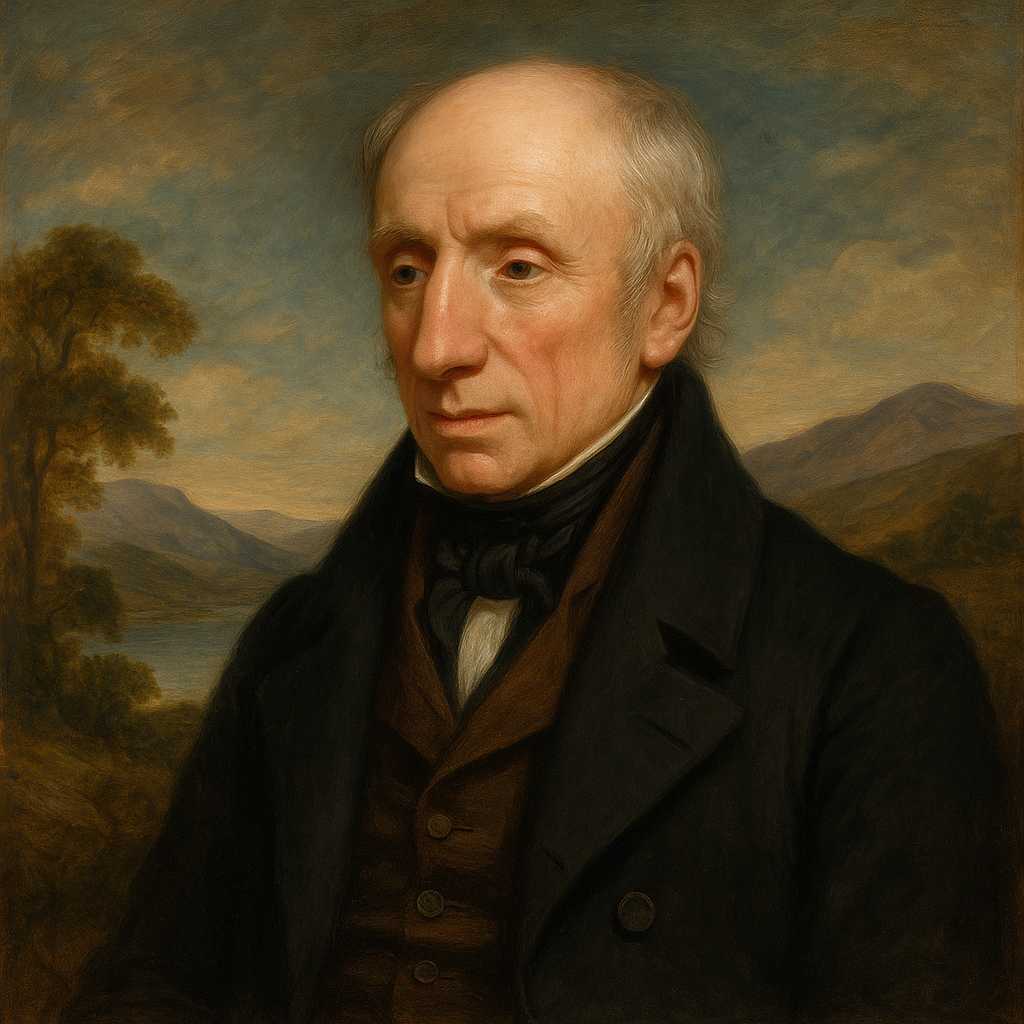The World Is Too Much With Us
William Wordsworth
1770 to 1850

The world is too much with us; late and soon,
Getting and spending, we lay waste our powers;—
Little we see in Nature that is ours;
We have given our hearts away, a sordid boon!
This Sea that bares her bosom to the moon;
The winds that will be howling at all hours,
And are up-gathered now like sleeping flowers;
For this, for everything, we are out of tune;
It moves us not. Great God! I’d rather be
A Pagan suckled in a creed outworn;
So might I, standing on this pleasant lea,
Have glimpses that would make me less forlorn;
Have sight of Proteus rising from the sea;
Or hear old Triton blow his wreathèd horn.
William Wordsworth's The World Is Too Much With Us
Introduction
William Wordsworth's sonnet "The World Is Too Much With Us" stands as a poignant critique of the human condition in the face of rapid industrialization and societal change. Composed during the early 19th century, this poem encapsulates the Romantic era's preoccupation with nature, spirituality, and the perceived loss of human connection to the natural world. Through its masterful use of imagery, metaphor, and classical allusions, Wordsworth crafts a powerful indictment of modern society's materialism and disconnection from the natural environment.
Historical and Literary Context
To fully appreciate the depth and significance of "The World Is Too Much With Us," one must consider the historical and literary context in which it was written. The late 18th and early 19th centuries witnessed the acceleration of the Industrial Revolution, a period of unprecedented technological advancement and societal transformation. This era of rapid change prompted many Romantic poets, including Wordsworth, to reflect on the human relationship with nature and the potential consequences of unchecked progress.
Wordsworth, along with his contemporaries such as Samuel Taylor Coleridge and Percy Bysshe Shelley, sought to reawaken humanity's spiritual and emotional connection to the natural world. This poem, therefore, can be seen as a manifestation of the Romantic ideal, which emphasized the importance of emotion, imagination, and the sublime in nature as a counterpoint to the rationalism and materialism of the Enlightenment period.
Structure and Form
The poem adheres to the traditional Petrarchan sonnet form, consisting of fourteen lines divided into an octave (the first eight lines) and a sestet (the final six lines). This structure is particularly well-suited to Wordsworth's purpose, as it allows for a clear division between the problem presented in the octave and the proposed solution or reflection in the sestet.
The rhyme scheme (ABBAABBACDCDCD) and iambic pentameter contribute to the poem's musicality and rhythm, creating a sense of order that contrasts with the chaotic modern world the poet describes. This formal structure also serves to contain and control the intense emotions expressed within the poem, reflecting the tension between human civilization and the untamed natural world.
Analysis of the Octave
The opening line, "The world is too much with us; late and soon," immediately establishes the poem's central theme: the overwhelming presence of worldly concerns in human life. The use of "late and soon" suggests a temporal continuity, implying that this condition pervades all aspects of human existence, past, present, and future.
In the second line, "Getting and spending, we lay waste our powers," Wordsworth employs a powerful metaphor to criticize the materialistic pursuits of society. The juxtaposition of "getting and spending" with "lay waste our powers" underscores the poet's belief that humanity's focus on material acquisition and consumption leads to a squandering of our innate spiritual and creative capacities.
The third and fourth lines, "Little we see in Nature that is ours; / We have given our hearts away, a sordid boon!" further develop this theme. The use of "Little we see" emphasizes humanity's spiritual blindness to the natural world, while "given our hearts away" suggests a voluntary relinquishment of our emotional connection to nature. The oxymoronic phrase "sordid boon" encapsulates the paradoxical nature of material progress – a supposed blessing that ultimately corrupts and diminishes the human spirit.
In the subsequent lines, Wordsworth personifies nature through vivid imagery: "This Sea that bares her bosom to the moon; / The winds that will be howling at all hours, / And are up-gathered now like sleeping flowers." These lines not only showcase the poet's mastery of natural imagery but also serve to highlight the contrast between the eternal, cyclical rhythms of nature and the frantic, artificial pace of human society.
The octave concludes with the line "For this, for everything, we are out of tune," which serves as a powerful summation of humanity's discord with the natural world. The musical metaphor of being "out of tune" reinforces the idea that humans have lost their harmonic relationship with nature, suggesting a fundamental dissonance in our existence.
Analysis of the Sestet
The volta, or turn, occurs at the beginning of the sestet with the exclamation "It moves us not. Great God!" This marks a shift in tone from lamentation to a more impassioned, personal reflection. The use of "Great God" as an interjection not only expresses the speaker's frustration but also introduces a spiritual dimension to the poem's themes.
In a startling declaration, the speaker proclaims, "I'd rather be / A Pagan suckled in a creed outworn." This preference for paganism over the speaker's presumed Christian faith is a bold statement, especially considering the religious climate of Wordsworth's time. The choice of the word "suckled" evokes imagery of nurturing and natural sustenance, contrasting sharply with the artificial and detached modern world described in the octave.
The final four lines of the poem introduce classical allusions to underscore the speaker's yearning for a more intimate connection with nature: "So might I, standing on this pleasant lea, / Have glimpses that would make me less forlorn; / Have sight of Proteus rising from the sea; / Or hear old Triton blow his wreathèd horn." The references to Proteus, the shape-shifting sea god, and Triton, the sea-deity known for his conch-shell trumpet, serve multiple purposes. They evoke a sense of ancient mythology and a time when humans were more closely attuned to natural forces. Additionally, these allusions suggest a longing for the ability to perceive the magical and transformative aspects of nature that modern humanity has lost.
The use of "glimpses" and "sight" in these lines emphasizes the visual aspect of this desired connection, while "hear" in the final line introduces an auditory dimension. This multisensory approach reinforces the idea of a complete, immersive experience of nature that the speaker craves.
Themes and Interpretations
At its core, "The World Is Too Much With Us" is a critique of modernity and its impact on the human spirit. Wordsworth presents a dichotomy between the natural world, represented by the sea, wind, and mythological figures, and the human world of "getting and spending." This juxtaposition serves to highlight the alienation of humanity from nature, a central concern of Romantic poetry.
The poem also explores themes of spirituality and the sacred. By contrasting Christian beliefs with pagan mythology, Wordsworth suggests that modern religious practices may have contributed to humanity's disconnection from nature. The speaker's preference for paganism can be interpreted as a desire for a more direct, unmediated relationship with the natural world and its inherent divinity.
Furthermore, the poem addresses the concept of time and its passage. The phrase "late and soon" in the opening line, coupled with the timeless quality of the natural imagery and mythological references, creates a tension between the transient nature of human concerns and the eternal cycles of the natural world.
Conclusion
"The World Is Too Much With Us" stands as a masterful exploration of humanity's relationship with nature and the consequences of modernization. Through its skillful use of form, imagery, and allusion, the poem articulates a profound sense of loss and a yearning for reconnection with the natural world. Wordsworth's work continues to resonate with readers today, perhaps even more powerfully than in his own time, as we grapple with the environmental and spiritual consequences of our increasingly technologized and disconnected lives.
In this sonnet, Wordsworth not only critiques the society of his time but also offers a timeless reflection on the human condition. The poem serves as a poignant reminder of the importance of maintaining our connection to nature and the potential for spiritual and emotional fulfillment that lies beyond the material world. As we continue to navigate the complexities of modern existence, Wordsworth's words echo across the centuries, urging us to reconsider our relationship with the natural world and to seek a more harmonious balance between progress and our primordial connection to the earth.
This text was generated by AI and is for reference only. Learn more
Want to join the discussion? Reopen or create a unique username to comment. No personal details required!



Comments
No comments yet. Be the first to comment!